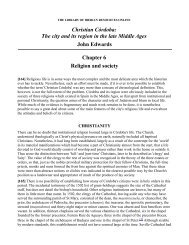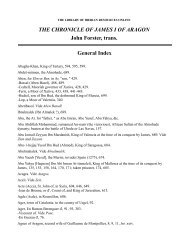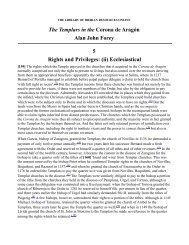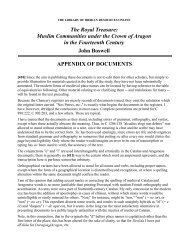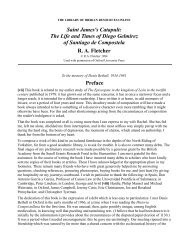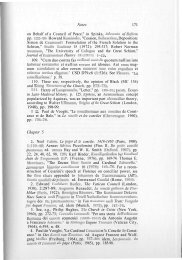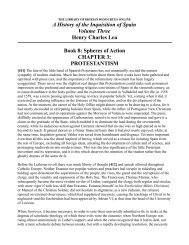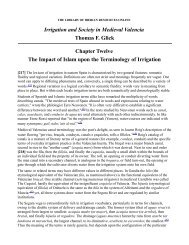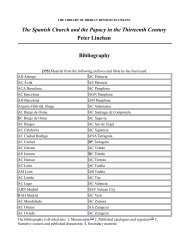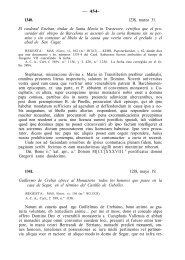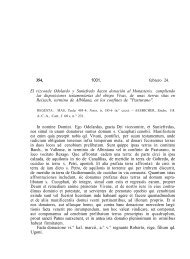Chapter 4 - The Library of Iberian Resources Online
Chapter 4 - The Library of Iberian Resources Online
Chapter 4 - The Library of Iberian Resources Online
Create successful ePaper yourself
Turn your PDF publications into a flip-book with our unique Google optimized e-Paper software.
[61] On the day appointed by John <strong>of</strong> Abbeville, Jubilate Sunday, he held his first provincial council at<br />
Tarragona. It was attended by seven <strong>of</strong> his suffragans (39) and lasted until the following Tuesday, three<br />
days, in accordance with the procedural instructions <strong>of</strong> the Forma de Sacro Concilio Tarracone<br />
Celebrando. (40) <strong>The</strong> legate's ghost was also there. His legislation was reissued complete, and the point<br />
was rammed home by the reiteration <strong>of</strong> those themes that had been most dear to him: clerici<br />
concubinarii (predictably); pluralism; marriage within the forbidden degrees; clerical involvement in<br />
secular affairs; vagabond monks and canons; and the relaxation <strong>of</strong> monastic discipline. (41) Yet Pedro<br />
had a mind <strong>of</strong> his own, and two <strong>of</strong> the items contained in the conciliar constitutions were his own<br />
contribution: the declaration <strong>of</strong> war against heresy, and the encouragement given to his staunchest allies<br />
in that war, the friars, whose founders were accorded solemn honours throughout the province. (42) Such<br />
was the archbishop's programme. All <strong>of</strong> the elements <strong>of</strong> the next twelve reforming years were defmed<br />
in 1239, and the bishops were left in no doubt about the energy with which he meant to pursue his end.<br />
Before he dismissed them, he reminded them once more <strong>of</strong> the Order <strong>of</strong> the Day -- the constitutions <strong>of</strong><br />
the Fourth Lateran Council and <strong>of</strong> John <strong>of</strong> Abbeville -- and warned them that ignorance <strong>of</strong> those<br />
provisions would constitute no defence when he descended upon their churches, as he intended to do,<br />
absque alia praemonitione. (43)<br />
One <strong>of</strong> his hearers was able to certify that this was not a meaningless threat, for already, in January<br />
1239, the church <strong>of</strong> Huesca had [62] received an archiepiscopal visitation. (44) <strong>The</strong>re was room for<br />
improvement at Huesca. <strong>The</strong> canons had become lax about their vows as regulars, and were rarely to be<br />
found in the refectory or dormitory. Cultus divinus was not celebrated properly, 'sine barbarismo et<br />
soloecismo'. <strong>The</strong>y were reminded <strong>of</strong> John <strong>of</strong> Abbeville's statutes (whether those <strong>of</strong> the Lérida Council<br />
or a special set designed for them is not clear) about pawning their goods, wearing flashy clothes and<br />
spending the night in town. 'Omnia verbo ad verbum sunt domini Sabinensis', in short. (45) And the<br />
same may be said <strong>of</strong> the archbishop's constitutions for the church <strong>of</strong> Vich, which he visited in the<br />
following August. (46) Yet to this body <strong>of</strong> doctrine and code <strong>of</strong> discipline Pedro brought a new spirit <strong>of</strong><br />
moderation. It is noticeable that on neither occasion did he reiterate the legate's thoroughgoing<br />
sanctions against concubinage. Instead, Vidal <strong>of</strong> Huesca was enjoined to proceed cum diligentia, and it<br />
was left to Bernardo <strong>of</strong> Vich to use his discretion in implementing the sentences authorised by John and<br />
Sparago. (47) Pedro felt able to trust their judgement, having had a hand in the appointment <strong>of</strong> the one<br />
and having personal experience <strong>of</strong> the saintliness <strong>of</strong> the other.<br />
What did concern him, wherever he travelled in his province, was the state <strong>of</strong> parochial organisation<br />
and the removal <strong>of</strong> obstacles to popular devotion. In some places he was confounded by geography. His<br />
own cathedral church when he had been bishop <strong>of</strong> Lérida, for example, presented its parishioners with<br />
a steep climb, 'cum in monte consistat excelso iuxta quem dicta civitas est constructa', as they<br />
complained to Urban IV some twenty years later, requesting the provision <strong>of</strong> facilities for baptism and<br />
marriage at a lower altitude. (48) Likewise, [63] the parochial organisation <strong>of</strong> the diocese <strong>of</strong> Zaragoza,<br />
which he visited in March 1242, was hopelessly muddled, largely on account <strong>of</strong> its size -- cum sit<br />
latissima et diffusa -- and the inefficiency <strong>of</strong> its archpriests upon whom so much depended. (49) But<br />
Pedro was less accommodating than Urban IV, and the citizens <strong>of</strong> Zaragoza on that same occasion<br />
received little sympathy from him in their quarrel over tithes and the sacraments with the cathedral<br />
clergy. (50) He was a stickler for the rules. At Huesca he insisted on a strict definition <strong>of</strong> parish<br />
boundaries, which he found confusas et minime limitatas, and also on the sovereignty <strong>of</strong> each resident<br />
rector over parochial revenues. (51) In the diocese <strong>of</strong> Tortosa he emphasised that the parish clergy had to<br />
be ordained and resident. (52) And though his main consideration when he visited Valencia Cathedral in<br />
June 1242 was that the divine <strong>of</strong>fice should be decently administered 'diurnis horis pariter et nocturnis'



